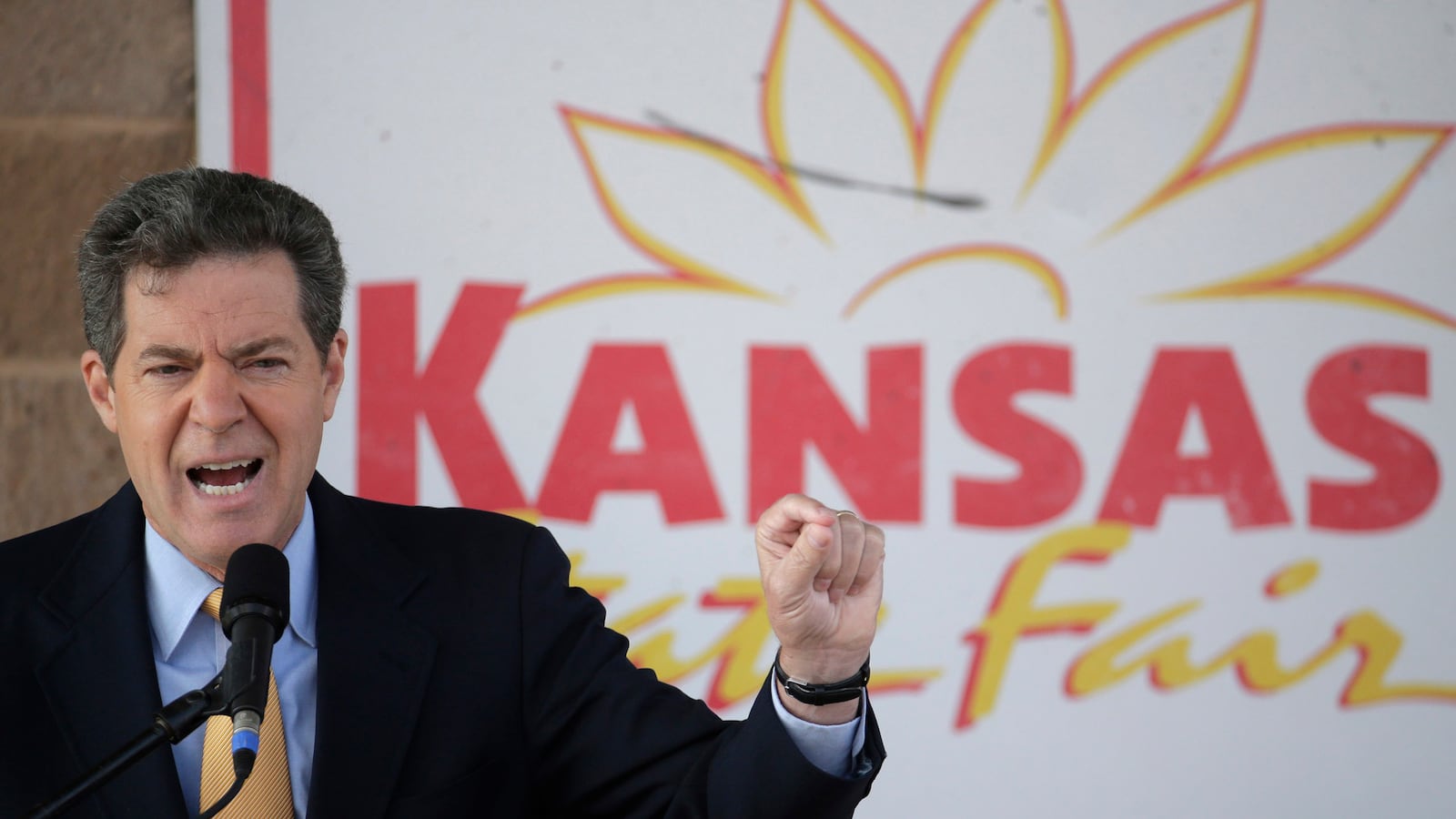For many political observers, the question about Kansas these days is no longer, “What’s the matter?” so much as, “What the fuck?”
There was the unexpectedly close GOP Senate primary—three-term incumbent Pat Roberts wound up winning by 7 points—and the forced retirement of the Democratic Senate candidate; there’s the fact that Gov. Sam Brownback, whose average margin of victory in state-wide races is 23 points, is now fighting for his political life. Tom Frank made the state famous for illustrating how its citizens elected conservative candidates whose actual policies went against the voters’ economic self-interest; after one term of Brownback’s “Tea Party experiment,” Kansas voters seem to have enlightened their self-interest and want to undo the extremism that Brownback both promised and delivered. The question remains as to whether their Republican candidates will ever wise up to the same conclusion.
There’s no doubt that Brownback’s radically conservative economic policies failed. Schools closed, the deficit ballooned, highways crumbled, jobs disappeared—I imagine ruby slippers were hocked. That failure has the reddest state in the nation blushing blue.
Citing the state’s fiscal woes, moderate and not-so-moderate Republicans have flocked to Brownback’s opponent, Paul Davis, who trails by just 0.6 points. On the Senate front, independent candidate Greg Orman, who may be forced to caucus with the Democrats by default (RNC chair Reince Preibus has said his caucusing with the GOP would be "impossible"), is reaping the benefits of that Tea Party-weighted primary. “Traditional Republicans for Common Sense,” made up of 70 Republican moderates who served in the Kansas legislature, endorsed Orman and he is favored by independent voters by a margin of 30 points.
In the face of this, both Brownback and Roberts have chosen not to battle for the wide swath of Kansas voters who identify as moderate Republicans (47 percent, versus 38 percent “conservative Republicans”), but to move further to the right. In a just world, Roberts’ violation of Godin’s Law (warning that “our country is heading toward national socialism”) would mean that we could simply ignore him from here on out. But his lumbering lurch toward the Ted Cruz tin-foil-hat convention should instead be an object lesson for Republicans to come. (Brownback can’t really be said to have shifted right but rather has celebrated already being there.)
It’s true both races have tightened, with Roberts eking out a lead: 5 points in an average of the latest polls. Their still-slim chances of victory, however, hardly validate the GOP’s decision to double-down on the hard-right voters who have yet to make the connection between the false populism of tax cuts and their own dire straits. For those seeking to figure out a long-term strategy for Republican victories in Kansas, shouldn’t who supports him matter less than the masses of voters who have left both him and Brownback?
Think about it: If a ruinous adventure into Laffer-land has already alienated many Republican voters, won’t a further march into the barren fields of zero-tax-revenue put off even more? Combine this possibility with the inevitable demographic erosion of the GOP’s base and one has to wonder not just if the Republican leadership is shooting itself in the foot, but why it is. Is it misplaced, or at least short-sighted, cynicism, which might have them believe that their old white guy coalition (if you can call it that) will sustain them a few more cycles? (At least long enough to pass voting restrictions?) Or is it a form of psychosomatic blindness, a function of such deeply held, incorrect perceptions, that the party leaders literally cannot imagine the need to change their tactics, much less their policies?
The motivations matter mostly because understanding them can help progressives sharpen their arguments, or maybe let us know if the argument is even worth having. In other words, are we dealing with cynics or zealots?
Obviously, one hopes for the former. Cynics respond to defeat, for one thing. Cynics and opportunists look at polls. Cynics are the lifeblood of representative democracy. Cynics will do anything to save their own skin, even change their minds.






